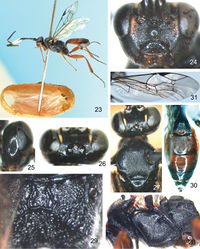Aptesis
| Notice: | This page is derived from the original publication listed below, whose author(s) should always be credited. Further contributors may edit and improve the content of this page and, consequently, need to be credited as well (see page history). Any assessment of factual correctness requires a careful review of the original article as well as of subsequent contributions.
If you are uncertain whether your planned contribution is correct or not, we suggest that you use the associated discussion page instead of editing the page directly. This page should be cited as follows (rationale):
Citation formats to copy and paste
BibTeX: @article{Li2013ZooKeys290, RIS/ Endnote: TY - JOUR Wikipedia/ Citizendium: <ref name="Li2013ZooKeys290">{{Citation See also the citation download page at the journal. |
Ordo: Hymenoptera
Familia: Ichneumonidae
Name
Aptesis Förster, 1850 – Wikispecies link – Pensoft Profile
- Aptesis Förster 1850[1]. Archiv für Naturgeschichte. 16(1): 71. Type species: Ichneumon sudeticus Gravenhorst, 1815. Designated by Viereck 1914[2].
Diagnosis
Clypeus weakly to rather strongly convex in lateral review, apex truncate or broadly and gently convex, sometimes faintly concave and sometimes with a median tooth.Mandible of moderate length, its lower tooth the same size as upper tooth or sometimes slightly smaller, rarely slightly larger. Tyloids linear to elliptic or subcircular, on about 5 segments, beginning on flagellomeres 9, 10, or 11. Epomia absent or rudimentary. Mesoscutum rather weakly convex. Notaulus vestigial or reaching as much as 0.3 of distance to scutellum. Sternaulus distinct over more than 0.5 of mesopleuron, its end pointing to lower hind corner of mesopleuron. Juxtacoxal carina complete and strong. Propodeum of moderate length to short, with or without weak apophyses. Costula usually present in males, usually incomplete or absent in females, but sometimes absent in males and sometimes complete and strong in females. Propodeal spiracle circular or short elliptic. Areolet pentagonal, moderate size. Median dorsal carinae of first tergum usually weak and reaching about to the spiracle, rarely longer and stronger. Dorsolateral part of postpetiole usually carinate between spiracle and apex, or rarely rounded. Ovipositor sheath about 0.35 times as long as fore wing. Ovipositor straight, tip usually elongate sagittate but sometimes shorter, teeth on lower valve weak, oblique, separated into a basal and an apical series (Townes 1970[3]).
Key to species of Aptesis known in China
Taxon Treatment
- Li, T; Sheng, M; Sun, S; 2013: Chinese species of the genus Aptesis Förster (Hymenoptera, Ichneumonidae) parasitizing sawflies, with descriptions of three new species and a key to species ZooKeys, 290: 55-73. doi
Other References
- ↑ Förster A (1850) Monographie der Gattung Pezomachus, Grav. Archiv für Naturgeschichte 16(1): 49−232.
- ↑ Viereck H (1914) Type species of the genera of Ichneumon flies. United States National Museum Bulletin 83: 1−186. doi: 10.5479/si.03629236.83.1
- ↑ Townes H (1970) The genera of Ichneumonidae. Part 2. Memoirs of the American Entomological Institute 12: 1−537.
Images
|




